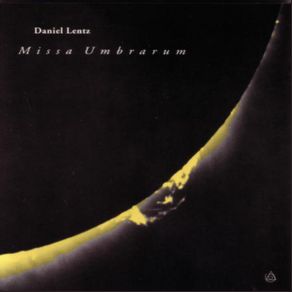Missa Umbrarum
Download links and information about Missa Umbrarum by Daniel Lentz. This album was released in 1985 and it belongs to New Age genres. It contains 4 tracks with total duration of 54:03 minutes.

|
|
|---|---|
| Artist: | Daniel Lentz |
| Release date: | 1985 |
| Genre: | New Age |
| Tracks: | 4 |
| Duration: | 54:03 |
| Buy it NOW at: | |
| Buy on iTunes $9.99 | |
| Buy on Amazon $8.99 | |
Tracks
[Edit]| No. | Title | Length |
|---|---|---|
| 1. | O-Ke-Wa | 13:50 |
| 2. | Missa Umbrarum | 22:44 |
| 3. | Postludium | 8:17 |
| 4. | Lascaux | 9:12 |
Details
[Edit]Daniel Lentz is a California-based composer who achieved some degree of notoriety in the '80s for his melding of minimalist formulas with softer, more romantic (some might say new age-y) notions, making special use of struck and rubbed wine glasses. At his best, as on the composition "Wild Turkeys," he achieves a giddy ecstasy, easily pulling the listener along for the ride. Other times, a portentousness sets in, a heavy-handed appropriation of fashionable ethnic themes that causes the work in question to suffer from either hubris or preciousness. The former is somewhat the case on the opening piece here, "O-Ke-Wa," based on Seneca themes. Scored for ethereal vocals with bells and percussion, it's reasonably attractive but all the rough edges have been thoroughly sanded away, leaving a piece bland enough to serve as an NPR theme. The title track is essentially a Catholic mass reworked for chorus and wine glasses. The vocal phrasing and ringing percussion give it an oddly Asian flavor, but the enunciation of the Kyrie Eleison drags it back into an uncomfortable (to Western ears) alliance with the traditional Latin mass. It's very hard not to think of a quasi-hip modern horror movie score while listening. "Postludium" continues the reinterpreted mass to better effect, as the halos of sound produced by the rubbed wine glasses provide a rich, layered ground over which the short Latin phrases resonate effectively. The final piece, an earlier composition called "Lascaux," dispenses with vocals, allowing the wine glasses to wallow in their own luxuriant sound. It is a far more successful piece than what preceded it, and shows the benefit that relative simplicity can bring. An album full of works like this would have been far tastier.